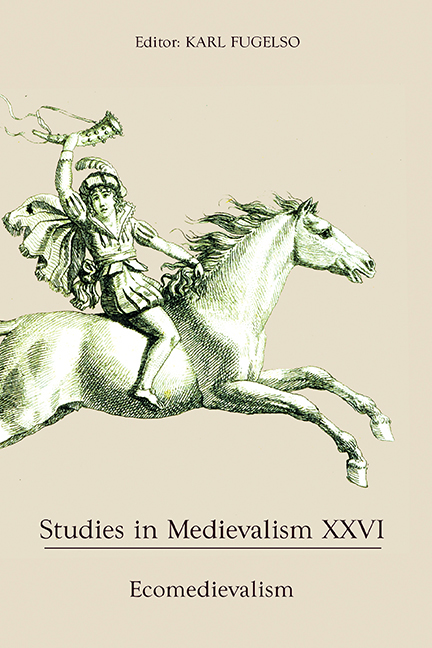Book contents
- Frontmatter
- Studies in Medievalism
- Acknowledgments
- Contents
- List of Illustrations
- Editorial Note
- I Ecomedievalism: Some Perspective(s)
- II Interpretations
- Fragmentary Dreams: John Aubrey's Medieval Heritage Construction
- Charter Horns and the Antiquarian Imagination in Early Modern England
- Giving Voice to Griselda: Radical Reimaginings of a Medieval Tale
- Medieval and Futuristic Hells: The Influence of Dante on Ellison's “I Have No Mouth and I Must Scream”
- Reading Westeros: George R. R. Martin's Multi-Layered Medievalisms
- Modernity in the Middle: The Medieval Fantasy of (Coopted) Feminism in Disney's Maleficent
- Future Medieval: (Neo)Medievalism in Babylon 5 and Crusade
- Cosmopolitan Anxieties and National Identity in the Netflix Marco Polo
- Mapping Everealm: Space, Time, and Medieval Fictions in The Quest
- Medievalisms of the Mind: Undergraduate Perceptions of the “Medieval” and the “Middle Ages”
- Mask of the Medieval Corpse: Prosopopoeia and Corpsepaint in Mayhem's De Mysteriis Dom Sathanas
- Contributors
- Miscellaneous Endmatter
Medieval and Futuristic Hells: The Influence of Dante on Ellison's “I Have No Mouth and I Must Scream”
from II - Interpretations
Published online by Cambridge University Press: 15 September 2017
- Frontmatter
- Studies in Medievalism
- Acknowledgments
- Contents
- List of Illustrations
- Editorial Note
- I Ecomedievalism: Some Perspective(s)
- II Interpretations
- Fragmentary Dreams: John Aubrey's Medieval Heritage Construction
- Charter Horns and the Antiquarian Imagination in Early Modern England
- Giving Voice to Griselda: Radical Reimaginings of a Medieval Tale
- Medieval and Futuristic Hells: The Influence of Dante on Ellison's “I Have No Mouth and I Must Scream”
- Reading Westeros: George R. R. Martin's Multi-Layered Medievalisms
- Modernity in the Middle: The Medieval Fantasy of (Coopted) Feminism in Disney's Maleficent
- Future Medieval: (Neo)Medievalism in Babylon 5 and Crusade
- Cosmopolitan Anxieties and National Identity in the Netflix Marco Polo
- Mapping Everealm: Space, Time, and Medieval Fictions in The Quest
- Medievalisms of the Mind: Undergraduate Perceptions of the “Medieval” and the “Middle Ages”
- Mask of the Medieval Corpse: Prosopopoeia and Corpsepaint in Mayhem's De Mysteriis Dom Sathanas
- Contributors
- Miscellaneous Endmatter
Summary
Even though some scholars have identified important precursors to science fiction (hereafter abbreviated as sf) in premodern genres such as epic, the fantastic voyage, and utopia, pre-Enlightenment eras are mostly absent in many critical discussions of the origins of – and the important influences on – recent sf. Additionally, many sf scholars and authors often emphasize the futurity of the genre, not its orientation and links to the past. For example, Harlan Ellison (whose story is a main focus of this essay) once defined sf as: “Anything that deals in even the smallest extrapolative manner with the future of man and his societies, with the future of science and/or its effects on us.”
However, earlier time periods such as the Middle Ages have indeed been quite fruitful for contemporary sf. This essay explores the many ways in which one of the most well-known works of medieval literature – Dante Alighieri's early fourteenth-century poem Inferno – served as a powerful influence on one of the more famous texts to come out of the 1960s New Wave movement in sf: Harlan Ellison's fascinating and disturbing 1967 short story “I Have No Mouth and I Must Scream.” With its violent imagery, frank sexuality, unconventional metaphors, and experimental form, Ellison's story is a quintessentially New Wave text. Many writers and scholars also associate the New Wave with a conscious attempt by the authors of that era to stop looking only to previous sf authors for inspiration, and to instead begin drawing upon avant-garde artists like the Surrealist painter Salvador Dalí and the Beat novelist William S. Burroughs. This new iconoclastic attitude toward previous sf is well represented by the New Wave author J. G. Ballard's quip that “[g]reat author though he was, I'm convinced that H. G. Wells has had a disastrous influence on the subsequent course of science fiction.” But even though in a preface for the story “I Have No Mouth” Ellison declares that he “had to go into the future to write the story,” what he actually had to do was go into the medieval past to write it.
- Type
- Chapter
- Information
- Studies in Medievalism XXVIEcomedievalism, pp. 117 - 130Publisher: Boydell & BrewerPrint publication year: 2017



